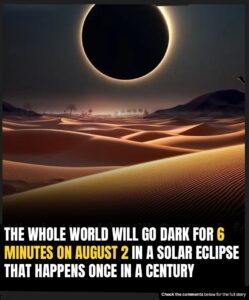A Century-Defining Solar Eclipse Will Plunge Earth Into Daytime Darkness for Over Six Minutes

Mark your calendars: on August 2, 2027, a rare celestial spectacle will cast parts of Earth into deep midday darkness for over six minutes—a cosmic event that won’t occur again until 2114.
This total solar eclipse, dubbed the “Great North African Eclipse,” will be the longest total eclipse witnessed since 1991, lasting six minutes and twenty-three seconds at its peak. During this extraordinary event, the Moon will align perfectly with the Sun, completely blocking its light and plunging parts of the planet into an eerie twilight.
A View Worth Traveling For
If you want the ultimate experience, Luxor, Egypt is the place to be. Experts predict this ancient city will offer the clearest and longest view of the eclipse anywhere on Earth. Luxor lies directly in the path of totality—the central shadow zone where the Sun is entirely obscured by the Moon.
But if a trip to Luxor isn’t possible, don’t worry. Several areas across North Africa, and select parts of Southern Europe (such as Gibraltar), will still offer excellent viewing opportunities. A wider area will experience a partial eclipse, which—while still breathtaking—won’t match the awe of full totality.
A Glimpse Into Astronomical Perfection
Although Earth is covered mostly by oceans, making most eclipses best seen from sea, this 2027 event is unique. It will be the longest land-visible total solar eclipse in nearly 100 years. That gives people across populated areas a rare chance to witness a phenomenon usually reserved for remote regions or ships at sea.
Total eclipses of this length are incredibly rare. According to calculations by eclipse expert Jean Meeus, the longest a total solar eclipse can possibly last is seven minutes and thirty-one seconds. This upcoming eclipse falls just shy of that maximum, making it all the more extraordinary.
What’s Next?
While there are other total eclipses on the horizon—in 2026 and 2028—they won’t compare in duration or land visibility to the Great North African Eclipse. Once it passes, the next chance to witness something similar won’t come around until well into the next century.
In short, this is a once-in-a-lifetime event. If you’ve ever dreamed of standing beneath a sky gone black in the middle of the day, this might be your best—and only—chance.